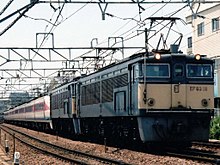Usui Pass
36°20′41″N 138°39′03″E / 36.3446°N 138.6507°E

The Usui Pass (碓氷峠, Usui-tōge) is a mountain pass that lies between Nagano and Gunma Prefectures in Japan. It has served as one of the major transportation routes in central Japan since at least the eighth century.
Road
The pass on the ancient Tōsandō highway was described as early as the 8th century, in the Nihon Shoki, as Yamato Takeru went through the pass during his journey in eastern Japan. Later, the Nakasendō, one of the five routes of the Edo period maintained by the Tokugawa shogunate (and one of the two that connected Edo, modern-day Tokyo, to Kyoto) followed the route through the pass.
The modern National Route 18, which goes through the pass, serves as a major link between the popular tourist spot Karuizawa and the Kantō plain (including Tokyo). A bypass and an expressway now make the trip faster and safer. The original road still exists as of 2013.
It was featured in numerous Initial D episodes as the home course of Impact Blue. It is also the home course of the real life drift racer Keiichi Tsuchiya.
Railway

The Shinetsu Main Line railway went through the pass between 1893 and 1997. The 11.2 km pass segment, between Yokokawa Station on the Gunma side and Karuizawa Station on the Nagano side, had been operated with the rack-and-pinion railway system until 1963 when the line was rebuilt and new locomotives for non-rack operation were introduced. The new locomotives were the JNR Class EF63 banking engines used for help in both ascending and descending the 66.7‰ (1 in 15) gradient line.[1] In 1997, the segment was closed due to opening of the new Nagano Shinkansen line that detours the pass with a long tunnel. A museum now stands on the site of the old locomotive shed at Yokokawa.
The prior-1963 line was featured in the Rail Wars episodes 8 and 9, where the characters take it with a draisine.[2]
References
- ^ Harada, Katsumasa (1981). "Technological independence and progress of standardization in the Japanese railways". JETRO. Retrieved 2 January 2009.
it was eventually decided to build the track at a steep grade of 66.7/1,000
- ^ "Rail Wars - 09, RABUJOI - An anime blog". 2014. Retrieved 19 October 2014.
Halfway into last week D4 wrestled their Little Draisine That Could to life and started their harrowing journey across the Usui Pass on a retired line.
